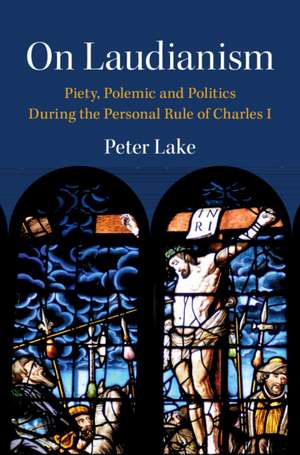On Laudianism: Piety, Polemic and Politics During the Personal Rule of Charles I: Cambridge Studies in Early Modern British History
Autor Peter Lakeen Limba Engleză Hardback – 29 sep 2023
Din seria Cambridge Studies in Early Modern British History
-
 Preț: 195.92 lei
Preț: 195.92 lei - 8%
 Preț: 530.93 lei
Preț: 530.93 lei - 11%
 Preț: 693.36 lei
Preț: 693.36 lei -
 Preț: 240.74 lei
Preț: 240.74 lei - 8%
 Preț: 530.27 lei
Preț: 530.27 lei - 9%
 Preț: 627.56 lei
Preț: 627.56 lei -
 Preț: 350.34 lei
Preț: 350.34 lei - 14%
 Preț: 919.83 lei
Preț: 919.83 lei -
 Preț: 422.86 lei
Preț: 422.86 lei -
 Preț: 419.37 lei
Preț: 419.37 lei -
 Preț: 314.10 lei
Preț: 314.10 lei -
 Preț: 441.96 lei
Preț: 441.96 lei -
 Preț: 366.58 lei
Preț: 366.58 lei - 11%
 Preț: 695.39 lei
Preț: 695.39 lei -
 Preț: 278.34 lei
Preț: 278.34 lei -
 Preț: 426.88 lei
Preț: 426.88 lei - 14%
 Preț: 919.33 lei
Preț: 919.33 lei - 14%
 Preț: 773.45 lei
Preț: 773.45 lei -
 Preț: 211.02 lei
Preț: 211.02 lei -
 Preț: 334.35 lei
Preț: 334.35 lei - 14%
 Preț: 828.64 lei
Preț: 828.64 lei -
 Preț: 356.88 lei
Preț: 356.88 lei -
 Preț: 446.58 lei
Preț: 446.58 lei - 14%
 Preț: 830.20 lei
Preț: 830.20 lei -
 Preț: 284.39 lei
Preț: 284.39 lei - 14%
 Preț: 867.49 lei
Preț: 867.49 lei - 14%
 Preț: 1223.82 lei
Preț: 1223.82 lei - 14%
 Preț: 963.64 lei
Preț: 963.64 lei -
 Preț: 336.20 lei
Preț: 336.20 lei -
 Preț: 445.81 lei
Preț: 445.81 lei -
 Preț: 274.11 lei
Preț: 274.11 lei -
 Preț: 362.54 lei
Preț: 362.54 lei - 14%
 Preț: 923.48 lei
Preț: 923.48 lei -
 Preț: 275.08 lei
Preț: 275.08 lei - 14%
 Preț: 733.64 lei
Preț: 733.64 lei -
 Preț: 276.39 lei
Preț: 276.39 lei -
 Preț: 336.48 lei
Preț: 336.48 lei -
 Preț: 408.81 lei
Preț: 408.81 lei -
 Preț: 309.27 lei
Preț: 309.27 lei -
 Preț: 369.67 lei
Preț: 369.67 lei -
 Preț: 274.27 lei
Preț: 274.27 lei - 14%
 Preț: 778.74 lei
Preț: 778.74 lei
Preț: 317.75 lei
Nou
Puncte Express: 477
Preț estimativ în valută:
60.81€ • 63.10$ • 50.83£
60.81€ • 63.10$ • 50.83£
Carte disponibilă
Livrare economică 22 februarie-08 martie
Livrare express 08-14 februarie pentru 55.71 lei
Preluare comenzi: 021 569.72.76
Specificații
ISBN-13: 9781009306812
ISBN-10: 1009306812
Pagini: 654
Dimensiuni: 241 x 162 x 43 mm
Greutate: 1.05 kg
Editura: Cambridge University Press
Colecția Cambridge University Press
Seria Cambridge Studies in Early Modern British History
Locul publicării:Cambridge, United Kingdom
ISBN-10: 1009306812
Pagini: 654
Dimensiuni: 241 x 162 x 43 mm
Greutate: 1.05 kg
Editura: Cambridge University Press
Colecția Cambridge University Press
Seria Cambridge Studies in Early Modern British History
Locul publicării:Cambridge, United Kingdom
Cuprins
Introduction: Part I. Laudianism, where it Came From: 1. A Trinitarian and incarnational theology; 2. Andrewes' political theology; 3. Andrewes' anti-puritanism; 4. Puritan politics; 5. The tree of repentance and its fruits; 6. Absent presences; the role of predestination in Andrewes' divinity; 7. The visible church and its ordinances; Part II. Laudianism, what it was: 8. The house of God; 9. The house of God and the beauty of holiness; 10. The beauty of holiness and ceremonial conformity; 11. Church ceremonies, the authority of the church and the authority of scripture; 12. Prayer; 13. Preaching; 14. The sacrament and the altar; 15. The sacrament and the social body of the church; 16. The altar and visible succession; 17. The feasts and festivals of the church, or putting the sabbath in its place; 18.Sunday sports and the re/constitution of the Christian community and the social order; 19. The sabbath and the Laudian attitude to authority; Part III. Laudianism, what it was n't: 20. Order, puritanism and the state of the English church; 21. Puritan 'privacy', or the forms of puritan voluntary religion anatomized; 22. A religion of the word and the question of authority; 23. Puritanism, popularity and politics; 24. Of moderate puritans and popular prelates; 25. The puritan threat, the church of England and the Personal Rule as a period of reformation; Part IV. Laudianism and Predestination: 26. Laudianism, puritanism and Arminianism revisited; 27. The language of mystery; 28. Fatal necessity; 29. Predestination, the positive case: of justice and mercy, prescience and predestination; 30. Faith, hope and charity; 31. Effort without merit; repentance, amendment and the works of penitence; Part V. Laudianism as Coalition, the Constituent Parts: 32. Dis-aggregating, or the pleasures and benefits of splitting; 33. Of converts, collaborators and apostates, i, puritans; 34. Of converts, collaborators and apostates, ii, Calvinist conformists; 35. Of apparatchiks, zealots and coming men; 36. The Laudian avant garde, (i) young men in a hurry; Cambridge University in the 1630s; 37. The Laudian avant garde, (ii) old men in a hurry; Robert Shelford, James Buck and Edward Kellett; 38. Tacking and trimming; negotiating the end of 'the Laudian moment'; 39. Conclusion.
Notă biografică
Descriere
Establishes the theological roots and political resonances of Laudianism, the dominant political theology of the Personal Rule.
